

Operant conditioning components of reinforcement and punishment are applied to encourage the desired driving behaviour in road users. Learning. What is Operant Conditioning? Operant Conditioning. How Reinforcement and Punishment Modify Behavior Operant conditioning, also known as instrumental conditioning, is a method of learning normally attributed to B.F. Skinner, where the consequences of a response determine the probability of it being repeated. Through operant conditioning behavior which is reinforced (rewarded) will likely be repeated, and behavior which is punished will occur less frequently. By the 1920s, John B. Watson had left academic psychology, and other behaviorists were becoming influential, proposing new forms of learning other than classical conditioning.
Flowchart. Untitled. Reinforcements and Punishments. Operant Conditioning - A simple overview. Reinforcement and Punishment (Positive and Negative) - Examples and Explanation. Road Safety Campaigns - how traffic police engages the public. RoadSense Carnival On 6 July 2019, Traffic Police organised the RoadSense Carnival at the Ngee Ann City Civic Plaza.
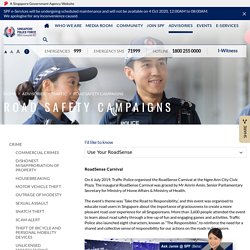
The inaugural RoadSense Carnival was graced by Mr Amrin Amin, Senior Parliamentary Secretary for Ministry of Home Affairs & Ministry of Health. The event’s theme was ‘Take the Road to Responsibility’, and this event was organised to educate road users in Singapore about the importance of graciousness to create a more pleasant road user experience for all Singaporeans. More than 3,600 people attended the event to learn about road safety through a line-up of fun and engaging games and activities.
Traffic Police also launched eight characters, known as “The Responsibles”, to reinforce the need for a shared and collective sense of responsibility for our actions on the roads in Singapore. Road Safety Tips. A safe road journey cannot be taken for granted!
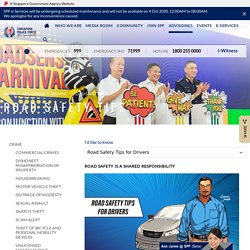
Like Gracious Joseph, remember to always exercise patience and graciousness. Stay alert, drive carefully and follow traffic rules, signs, and signals. Follow these safe-driving tips and habits to enhance your experience on the roads, and make your journeys more safe and pleasant. Never drink and drive. Never get behind the wheel when you’re tired. Maintain your vehicle regularly to minimise the chances of an accident due to mechanical failure. Road Safety Approach in Singapore - A brief overview. Stricter traffic laws to punish reckless motorists. Strengthening Deterrence Against Irresponsible Driving. Penalties for Dangerous Driving for Singapore Drivers.
Perhaps you’re a fan of the Fast & Furious film franchise and want to try out those cool car stunts for yourself.
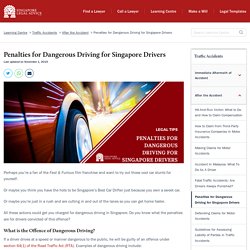
Or maybe you think you have the hots to be Singapore’s Best Car Drifter just because you own a sweet car. Or maybe you’re just in a rush and are cutting in and out of the lanes so you can get home faster. Strengthening Deterrence Against Irresponsible Driving. SPF Traffic Police Patrol Unit. Untitled. Traffic Police giving out vouchers for safe driving. When Mr Lim Kan Seng's Toyota Previa was pulled over by the Traffic Police along New Upper Changi Road yesterday morning, he panicked a little. Mr Lim, 50, a hawker, thought he might be in for a summons, but what he received instead were a zebra plush toy and $40 worth of petrol vouchers.
"I thought I had done something wrong... but the police said they saw me giving way to another driver, and wanted to commend me," he said. "I had just turned left into the main road when another car was trying to cut into my lane from the right, so I let him pass. " Mr Lim was among seven motorists who were pulled over on the roads yesterday for displaying good driving habits, as part of a nine-hour island-wide "Spot the Conscientious Motorists" operation conducted by the police.
In Singapore, Traffic Police Give Vouchers As Well As Fines. Nobody likes traffic enforcement officers, or the summons they give when they catch you.
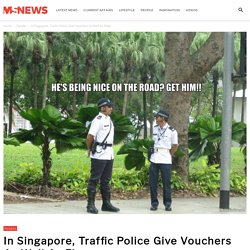
Now, however, Traffic Police have chosen to commend motorists for showing good behaviour…by giving them a commendation certificate, zebra plush toys, and petrol vouchers. Source They give out zebra plush toys because that’s the mascot for the Singapore Road Safety Council. So no asking for Baymax. TRAFFIC POLICE REWARDS CONSCIENTIOUS... - Singapore Police Force. Certificate of Merit. What is it? And how can you get one? Getting a driver’s licence ensures that you are qualified to drive.
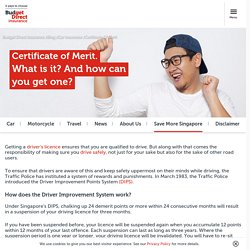
But along with that comes the responsibility of making sure you drive safely, not just for your sake but also for the sake of other road users. To ensure that drivers are aware of this and keep safety uppermost on their minds while driving, the Traffic Police has instituted a system of rewards and punishments. In March 1983, the Traffic Police introduced the Driver Improvement Points System (DIPS). How does the Driver Improvement System work? The 5 Different Types of Traffic Cameras in Singapore. (Photo Credit: Pexels) To deter speedsters from driving recklessly, the Land Transport Authority(LTA) and Traffic Police have put in place five different types of traffic enforcement cameras around the island.
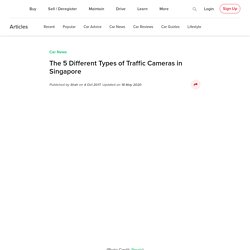
Here's a detailed guide on all five of them. Updated: 11 May 2018, Friday 1. Fixed Speed Camera The first type of speed camera is the Fixed Speed Camera (FSC). These cameras will, and for sure, put a halt to speed demons when they see these brightly painted cameras standing tall, staring into every car that drives past. As of 14th September 2017, 20 of these cameras are already implemented across 11 locations islandwide to complement the Mobile Speed Cameras that are already implemented. 2. As mentioned above, Mobile Speed Cameras (MSC) are currently in operation and they are positioned across various locations in Singapore. MSCs are more "lethal" in a sense that they are more "pin-point" when it comes to bringing speedsters to justice. 3.
(Photo Credit: Wikimedia Commons) 4. 5. Summary. Traffic Police to trial new cameras that detect illegal U-turns, vehicles stopping in yellow box junctions. Installing speed cameras as negative reinforcement. Untitled. Driver's Improvement Point System (DIPS) Traffic Offences in Singapore: Demerit Points & Composition Fines (2020 Update) (Photo Credit: Singapore Police Force) Updated: 25 August 2020.
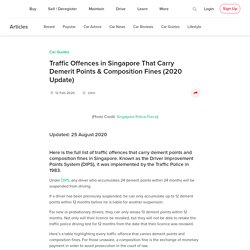
More than 1,400 booked for driving without licence last year: MHA, Courts & Crime News. More people were caught driving without a licence over the past five years, as the number of offenders increased by 55 per cent from 921 in 2014 to 1,435 last year, said the Ministry of Home Affairs. Offenders included those who drove with a revoked or invalid licence, or without a prior licence.
Singapore Road Safety Council chairman Bernard Tay said there may be more offenders now because of a perception that they are unlikely to be caught. It could also be that more people are private-hire or commercial drivers. 50 summonses issued to drivers of heavy vehicles. Parliament: Licences of 69 drivers revoked for driving with disabilities or diseases that affect safety, Politics News.
SINGAPORE - The driving licenses of 69 drivers were revoked over the past four years after they were found to have disabilities or diseases that impeded their driving abilities. Parliamentary Secretary for Home Affairs Amrin Amin told the House on Tuesday (Jan 10) that drivers' licences are revoked if they fail medical examinations after they were involved in accidents or other investigations.
Of the 69 cases, 12 were drivers involved in accidents due to their conditions, he said. He was responding to questions from Mr Murali Pillai (Bukit Batok) on whether the Traffic Police intends to require drivers and medical professionals to report cases where drivers develop diseases or disabilities which could affect their driving safety. Mr Amrin said the Ministry of Home Affairs will study the practices of other countries and see what the best options for Singapore are.
Parliament: Recalcitrant drink-drivers to face lifetime driving ban under stiffer penalties proposed to Road Traffic Act, Politics News. SINGAPORE - Recalcitrant motorists who drive under the influence of alcohol or drugs could face a lifetime ban from driving and also double the jail time, under proposed changes to the Road Traffic Act that would also stiffen penalties for dangerous and careless driving offences. For instance, minimum mandatory sentences for dangerous driving causing death and grievous hurt, as well as additional penalties for offenders who did so while under the influence of alcohol and drugs, were also among changes proposed in Parliament on Monday (May 6). Under the Road Traffic (Amendment) Bill, road users who drive under the influence of drugs or alcohol will face double the penalties that are currently stipulated in law. Currently, those convicted can face up to six months in jail or be fined between $1,000 and $5,000 for the first offence. For the second offence, they can be jailed for a maximum of one year and fined between $3,000 and $10,000.
Revoking driver's license as negative punishment. In their push towards digitalisation, the Traffic Police (TP) announced that physical driving licenses will no longer be issued unless motorists request for one.
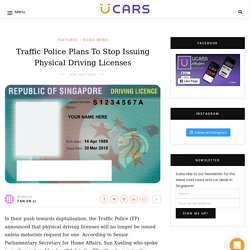
According to Senior Parliamentary Secretary for Home Affairs, Sun Xueling who spoke in parliament on Monday (8 July), the TP will only require the individual’s NRIC and date of birth to determine their driving qualifications. The Current Road Traffic Act | Image Source: Singapore Statutes Online Following her statement, amendments were made to the Road Traffic Act under section 35C such that motorists will no longer have to surrender their physical licenses if they do not own one. Another change that was proposed during the 2nd reading of the Road Traffic (Amendment) Bill included suspending or revoking a motorist’s license four weeks from the date of notice, even if the appeal against it is still being processed.
“They file multiple unmerited appeals at different junctures, and through different channels.